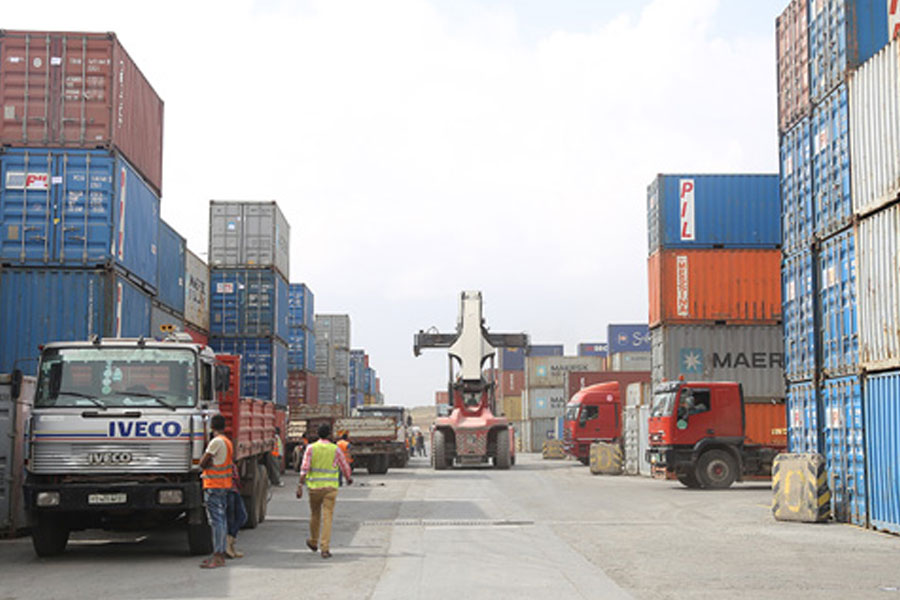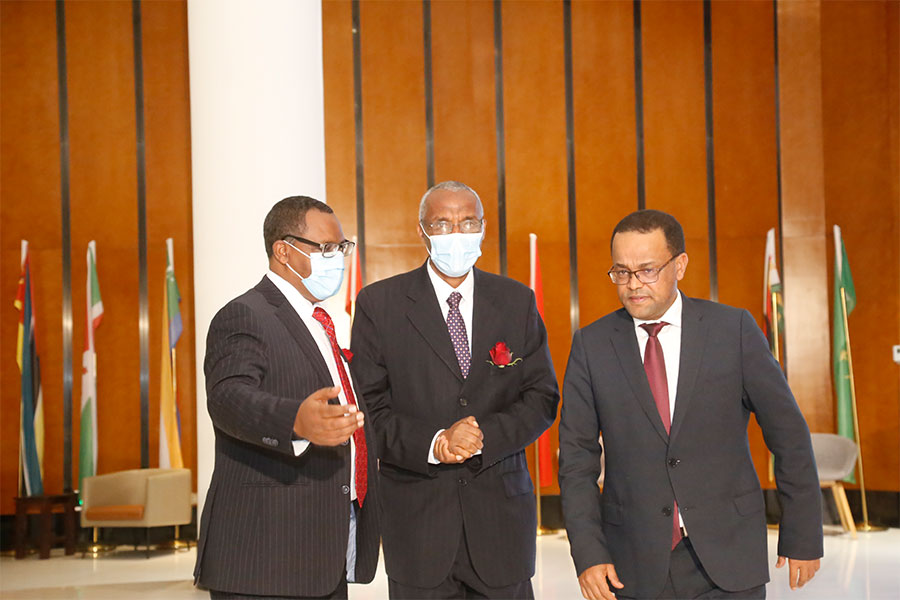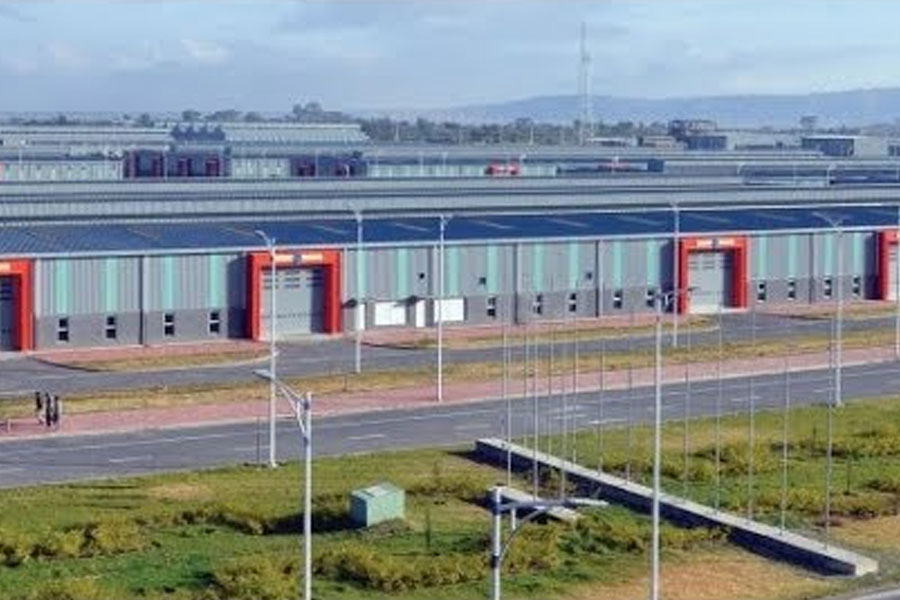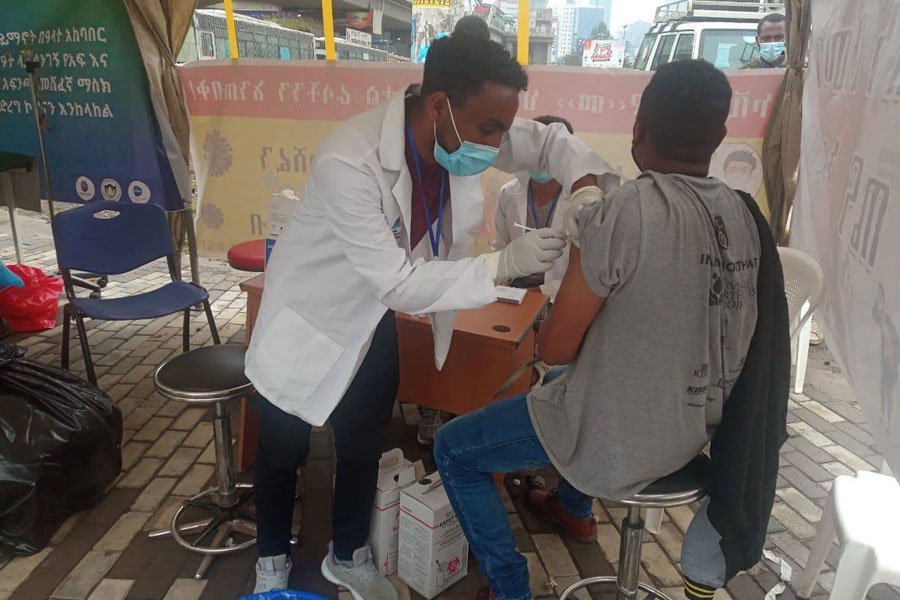
Radar | Sep 10,2021
Merhawit’s days in the town of Mai Kadra, Tigray Regional State, were mostly calm and quiet. She worked shifts at the local health centre and cooked her lunch at home, where she lived alone. A regular day ended with her watching TV before settling in for the night.
The 26-year-old health worker was assigned to the post in this small dusty town, located near the Sudanese border, from her hometown in Adigrat, an eight-hour drive away. She would make regular trips to see her family, and her friends were the medical staff that she worked with; her life revolved around work and home. That was before November 9, 2020, five days after the federal government launched a military offensive in Tigray Regional State. The town of Mai Kadra was bombarded as Merhawit was giving care to patients in the emergency section of the health centre. Suddenly, she saw a flood of badly injured patients.
“Some had also lost limbs from machete attacks,” she said.
By the time she realised what had happened, the health centre where she was had come under heavy shelling. All the staff had fled for their lives. Armed men came in soon after and told her to start taking care of their comrades.
“The patients were asking me to stay as I was the last one left,” she told Fortune. “But I was scared and ran away when the militiamen weren’t looking.”
Merhawit jumped over the centre’s fence and joined hundreds of others who were making the mass exodus from their homes, away from the bombs and leaving everything behind. After walking nearly 30Km on foot to Humera, a nearby town, she came across someone driving a tractor who offered to give her a lift, a common sight she saw on her trip, as many farmers in the area used whatever means they could to escape the war.
Along the way, Merhawit helped women in labor give birth; the strenuous walks had hastened the due dates of many expectant mothers in their bid to flee the violence.
“I had nothing to use,” she said. “One time, I used a plastic bag to cover my hands to deliver a baby on the road.”
After two days of walking, Merhawit’s feet were badly blistered, and she was unable to go any further. She found refuge at a woman’s home in Dedebit, 164Km further from Humera and the birthplace of the Tigray People's Liberation Front (TPLF) 46 years ago. The senior member in the EPRDF, a ruling coalition that led Ethiopia for 28 years and the ruling party in Tigray Regional State, it was the TPLF's move in running over the garrisons of the Northern Command that provoked the massive military offensive by the federal government and its allies.
People sift through a mound of donated items at Hawelti Primary School, the second school-turned-shelter for IDPs in Meqelle.
The coming days would prove to be as difficult for Merhawit as her journey took her through the towns of Axum, Adwa and Adigrat before she arrived in Tembien. She walked most of the way with the occasional passing truck giving her a ride.
“We'd spend a couple of days resting at one town, and then we’d continue as the military caught up and the shelling started again,” she recalled. “It felt like they were hunting for us."
Five months later, Merhawit is now sheltered with her father at Hawelti Primary School, one of the 10 schools used as temporary housing for internally-displaced people in Meqelle, Tigray Regional State's capital. Her two siblings, she would later learn, had crossed the border into Sudan. At Hawelti Primary School, she and her father are two of more than 1,700 people provided food and shelter.
Many have stories similar to Merhawit's. They spent several days walking in the wilderness, fleeing the violent conflict.
Like Hawelti, schools in the regional capital have been a sanctuary for over 11,000 people displaced from all across the region, with a single classroom housing up to 50 people. Dedicated storage rooms are filled with assorted vegetables, injera, and sacks filled with donated clothes. The support at the centres has come primarily from the residents of the city.
Terhas, a 30-year-old woman who fled from Humera in early November, is grateful to residents of Meqelle, who she says "have saved us."
"They've been organising among themselves to send us food every day,” she told Fortune. “They provide us with nearly everything we need, from sanitary materials to blankets and healthcare.”
She stays in Hawelti with her husband, while her three children stay at a relative’s house elsewhere in Meqelle.
Government input here has been minimal – most have been given a round of supplies consisting of 30 kilograms of wheat and soybeans and a litre of edible oil. Some earlier arrivals have gotten two rounds in the few months since they made it to Meqelle. But the wheat and soybeans are quickly exchanged for money that needs to be split a thousand ways. Water bills at the schools that have been accumulating since their arrival also need to be paid soon.
“We're trying to get it waived at the social affairs office here, but so far it has been difficult,” Terhas told Fortune. “We're also looking to get some security since the schools have none.”
She and a few others in the compound have taken matters into their own hands for the time being and started organising among themselves. Similar to other shelters in the city, they have formed committees to run the sites – managing donations, allotting resources and making pleas on behalf of the women and men in the shelters to government and aid agencies. Priority on her table last week was getting ID cards that help identify those sheltered in the school.
“This is for security reasons," said Terhas. "We don’t turn people seeking shelter away, although there isn’t much else we can give.”
The shelters are receiving support from the International Committee of the Red Cross, which provides 64,000 litres of water a day to the sites in the region. The organisation has also donated essential items to over 9,000 households across Meqelle, Shire and Adigrat; items such as cooking pots, sleeping mats and blankets as many left their homes with only the clothes on their backs.
This is also true for Kisanet Primary School, the first school that turned to a shelter in the city. Over 1,300 people are housed there and most, like at Hawelti, have come from the western parts of the Regional State, where the war first showed its ugliest sides.
Armed conflict in Western Tigray has been compounded by the forceful takeover of disputed areas by militia forces from the neighbouring Amhara Regional State. More than 140,000 people have been displaced from the western part of the region alone, according to reports by the United Nations Office for the Coordination for Humanitarian Affairs (UN-OCHA).
One of these forcefully evicted people is Haile, a 40-year-old farmer from Dansha, a northwestern Tigray town. He left behind his wife and son, seeking shelter that he has found at Kisanet. His wife, unlike him, was born and raised in Dansha, and had been spared from the killing that quickly followed the open conflict in the region. She stayed back to look after their land and home, but she is being harassed because of her marriage to him, he revealed.
“I'm telling her to leave everything and come,” he said. “There's no telling what they might do from one day to the next.”
Currently, the region has half a million internally-displaced people, some in official shelters and others seeking refuge in neighbouring towns. The numbers continue to grow as forceful expulsion commences in the western parts, according to aid agency reports. Coordinated efforts between humanitarian organisations have reached over one million people with food baskets, accounting for more than 1,160tn of food, according to the latest report from UN-OCHA.
But food aid provision has suffered heavy mismanagement — claims the government does not deny. Problems in the identification of beneficiaries, undue allotment, as well as the unfair distribution of rations across destinations are some examples, according to Etenesh Negussie, head of the region’s Communication Bureau.
“We've also come across evidence that some of the donated food is being stolen and sold,” she told Fortune. “Other sites have mentioned that [IDPs] are expected to pay for the food they're getting.”
With the government opening up more access to humanitarian aid agencies, experts suggest that this is the time to ensure that those in need are supported.
But like the residents of Meqelle city, who have stepped up in this moment of need, campaigning and involving individuals in providing support is key, according to Yeraswork Admassie, (PhD), executive director at the Forum for Social Studies, a think tank for policy research and developmental issues.
“Support to these groups should include fuel and water needs as well,” he said. “As giving food support to people who have nothing to cook it with has no meaning."
Attention should be given to hygiene in the shelters as neglect could lead to the spread of transmissible diseases, which could have devastating effects on the already struggling population.
“The role of civil society organisations should also be magnified here,” said Yeraswork.
But with little help from the government and food coming mostly from residents of the city, displaced people in the shelters say they have no guarantees for tomorrow. The conflict continues to rage, and their hometowns are more inaccessible than ever. This comes on top of an impending eviction date, with talks of the reopening of schools in the region casting a shadow on the small semblance of stability they have found at the makeshift camps.
Many like Merhawit and Terhas ask what they have done to deserve this treatment as they find themselves wedged in as collateral damage between two warring factions.
PUBLISHED ON
Mar 27,2021 [ VOL
21 , NO
1091]

Radar | Sep 10,2021

Commentaries | Nov 13,2021

Fortune News | Dec 04,2021

Fortune News | Aug 14,2021

Delicate Number | Nov 13,2021

Fortune News | Apr 03,2021

Fineline | Apr 25,2020

Life Matters | Dec 19,2021

Life Matters | May 31,2020

Featured | Nov 13,2021

Dec 22 , 2024 . By TIZITA SHEWAFERAW
Charged with transforming colossal state-owned enterprises into modern and competitiv...

Aug 18 , 2024 . By AKSAH ITALO
Although predictable Yonas Zerihun's job in the ride-hailing service is not immune to...

Jul 28 , 2024 . By TIZITA SHEWAFERAW
Unhabitual, perhaps too many, Samuel Gebreyohannes, 38, used to occasionally enjoy a couple of beers at breakfast. However, he recently swit...

Jul 13 , 2024 . By AKSAH ITALO
Investors who rely on tractors, trucks, and field vehicles for commuting, transporting commodities, and f...

Oct 25 , 2025
The regulatory machinery is on overdrive. In only two years, no fewer than 35 new pro...

Oct 18 , 2025
The political establishment, notably the ruling party and its top brass, has become p...

Oct 11 , 2025
Ladislas Farago, a roving Associated Press (AP) correspondent, arrived in Ethiopia in...

Oct 4 , 2025
Eyob Tekalegn (PhD) had been in the Governor's chair for only weeks when, on Septembe...